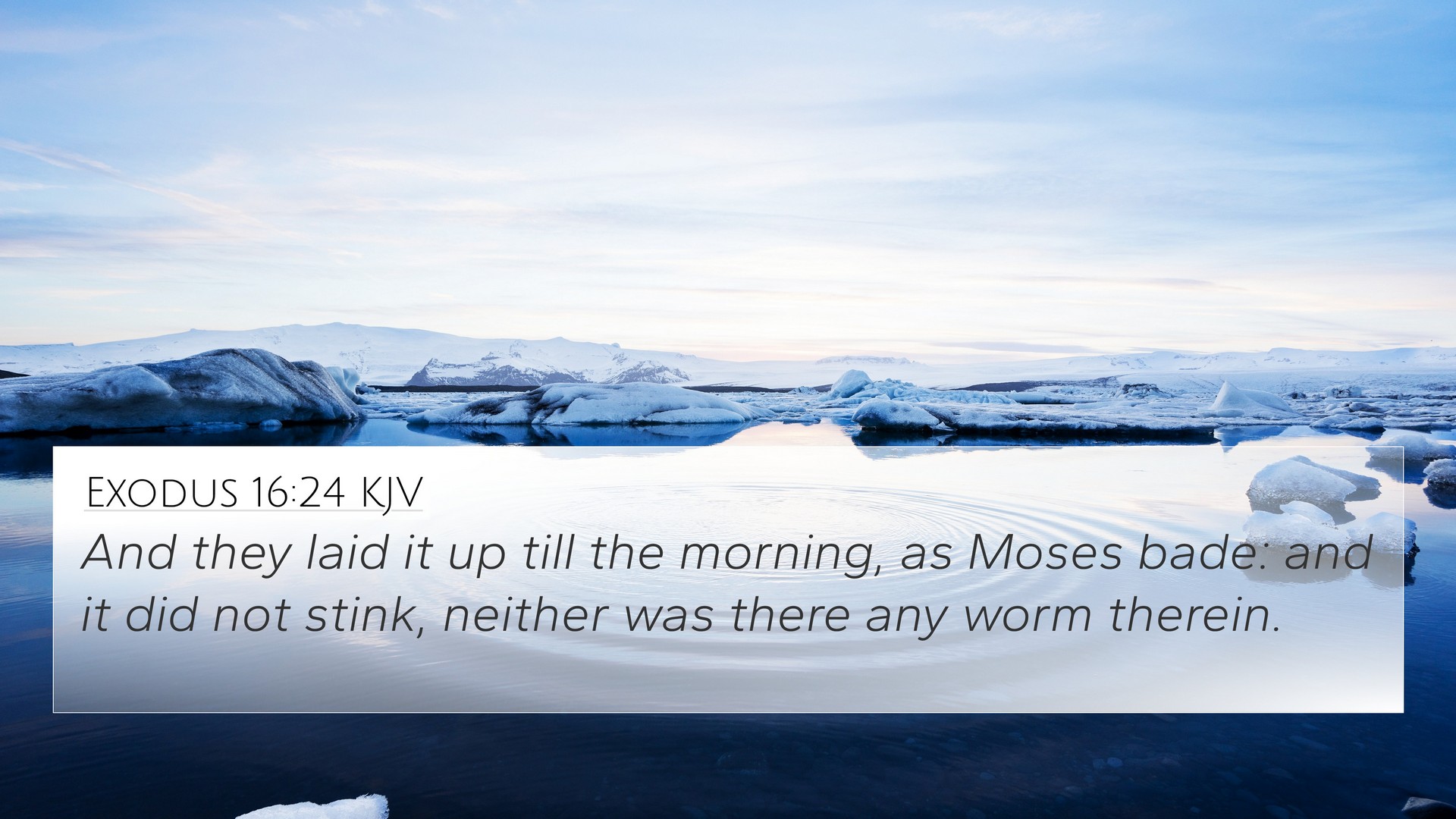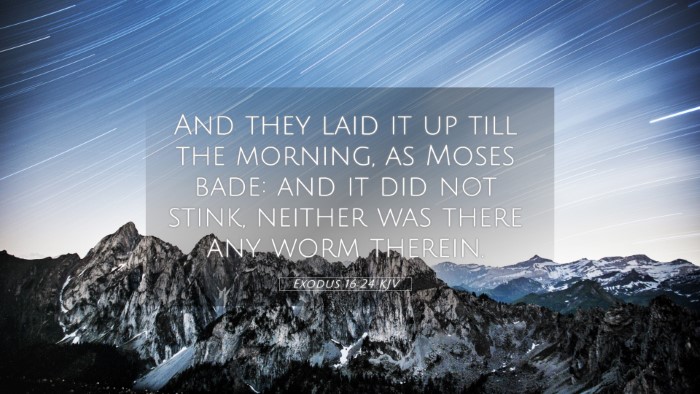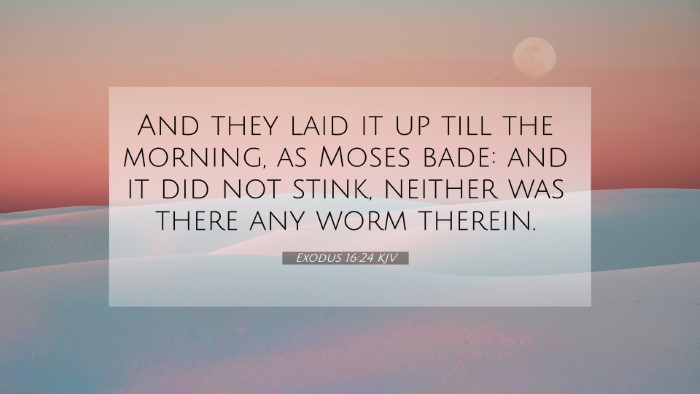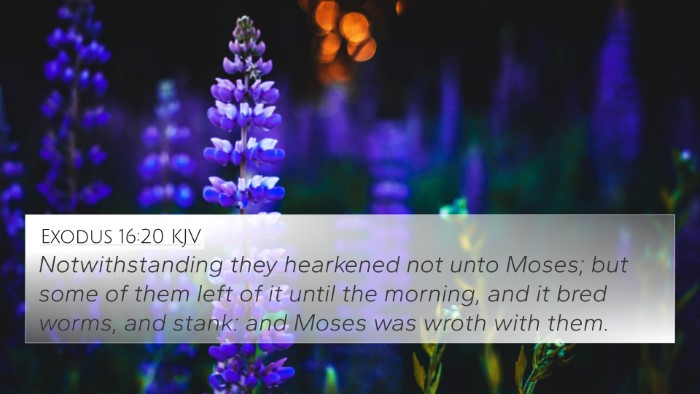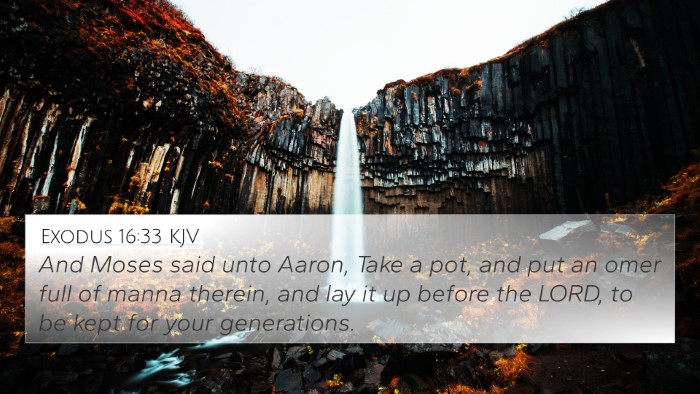Understanding Exodus 16:24
Bible Verse: Exodus 16:24 - "And they laid it up till the morning, as Moses bade: and it did not stink, neither was there any worm therein."
Contextual Overview
This verse is a part of the narrative describing God's provision of manna to the Israelites during their journey in the wilderness. It highlights their obedience to Moses's instructions regarding the gathering and preservation of this miraculous food.
Meaning and Interpretation
This verse reflects several key principles:
- Obedience: The Israelites’ compliance with Moses serves as an example of faithfulness to God’s commands.
- Divine Provision: The absence of decay illustrates that God's provisions are perfect and sustained by His power.
- Faithfulness in Trials: God’s provision during their time in the wilderness signifies His constant aid, reinforcing the theme of reliance on divine support.
Commentary Insights
Matthew Henry
Henry elaborates that the Israelites' actions showed obedience to the guidance of Moses, indicating that faith must be accompanied by action. They acted as instructed, laying up the manna, which signifies perfect trust in God’s promises. His commentary emphasizes that God's provisions do not corrupt, reflecting His eternal nature.
Albert Barnes
Barnes points out that the preservation of the manna overnight, without spoilage, demonstrates God’s miraculous power. This had a dual purpose: to instruct the people on proper collection and to symbolize that God is not merely a provider but one who offers provision that is beyond natural laws.
Adam Clarke
Clarke highlights the symbolic significance of the manna, interpreting it as a foreshadowing of the true bread from heaven, which Christians believe ultimately refers to Christ. He notes that this provision was not just physical sustenance but also spiritual nourishment, aligning with the scripture’s deeper theological implications.
Bible Verse Cross-References
This verse can be connected to several other scriptures that deepen its meaning:
- John 6:32-33: Discusses Jesus as the true bread from heaven.
- Deuteronomy 8:3: Reminds the Israelites of their dependence on God for sustenance.
- Matthew 6:11: "Give us this day our daily bread," emphasizing daily reliance on God.
- Philippians 4:19: "God shall supply all your need," reinforcing the concept of divine provision.
- Psalms 78:24-25: Describes God providing food from heaven to His people.
- Hebrews 9:4: Mentions the pot of manna as part of the contents of the Ark of the Covenant.
- Exodus 16:18: Shows that God provides enough for each person's needs without excess.
Thematic Connections
Exodus 16:24 connects with broader biblical themes such as:
- Faithfulness of God: God’s continuous support during trials for His people.
- God’s Miraculous Provision: Events throughout both the Old and New Testaments emphasize God's ability to provide for the needs of His followers.
- Obedience: Emphasizes that faith is demonstrated through obedience to God's word.
Tools for Bible Cross-Referencing
Studying cross-references, such as in this context, can enhance your understanding of biblical texts. Some useful tools include:
- Bible Concordance: A comprehensive directory of words and their occurrences throughout the Bible.
- Bible Reference Resources: Books and applications to assist in locating scripture connections.
- Cross-reference Bible Study: Systems designed for studying thematic and narrative connections between verses.
Conclusion
Exodus 16:24 serves as a powerful reminder of God's faithful provision for His people. By understanding this verse and its connections to other scriptures, we gain insights into the character of God as a provider and the importance of obedience in our spiritual journeys.
